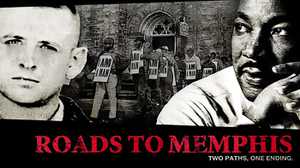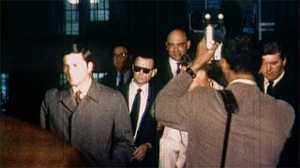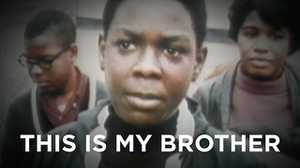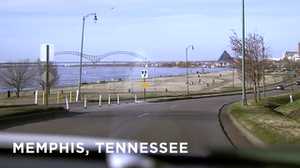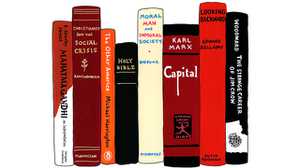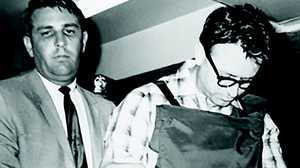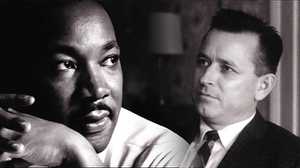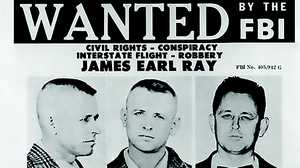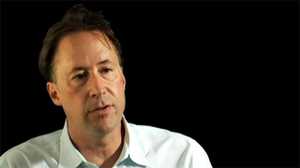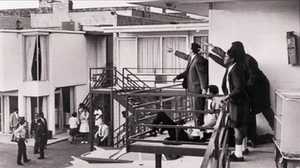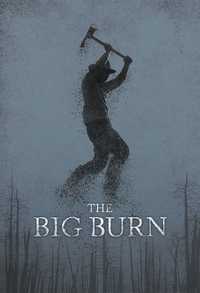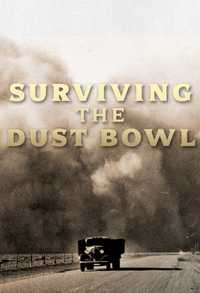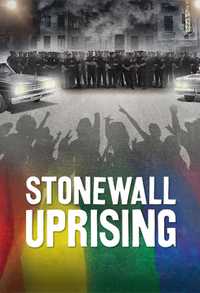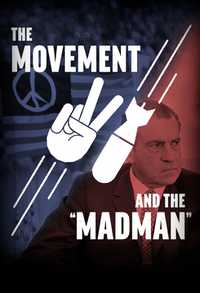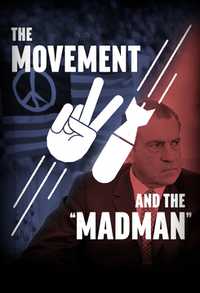Man at Press Conference (Archival): At 3:48, Shelby County Sheriff's Department received into its custody James Earl Ray, the accused slayer of Dr. Martin Luther King, Jr.
Dan Rather, Anchorman: The second before his arrest, James Earl Ray was the most wanted man in the United States. One of, if not the most wanted suspects in the world.
John Campbell, Assistant District Attorney: This was like assassinating a president in some ways. King by '68 was the face of the civil rights movement. He was an international figure.
Gerald Posner, Writer: When a public official, the magnitude of King, gets killed in the prime of their life, we can't quite imagine that. You've got this young charismatic preacher pulling together a movement with so much potential for the future, on the other hand, you have a four time loser, James Earl Ray, pulling off the assassination, it doesn't make sense.
Reporter (Archival): Do you have anything you'd like to say right now at this time?
Harris Wofford, Special Assistant to President Kennedy: The greatest single blow to my spirit was the assassination of Martin Luther King. A shudder went through the American people.
Joe Sweat, Journalist: I think it made America wake up. You had people saying, "Golly, is this- is this division we have with the blacks, has it come to this? Do we actually shoot people down?"
Samuel Kyles, Memphis Minister: Martin Luther King was so convinced that the only way we could win the battle was nonviolently. And he had made up his mind, with all of the risk involved, he wouldn't turn around. He wouldn't give up.
Roger Wilkins, US Department of Justice: There were black people who were saying that the magic was gone. They were saying, "Well, he's always talking about this peace stuff. Well, that's not- that's not how the cracker is, a cracker's got guns and he's going to kill us. And we got to have guns."
Dan Rather, Anchorman: The assassination speaks to what a dangerous time it was for the country, particularly for those who tried to give voice to our difficulties and the hope for a better day.
When James Earl Ray was arrested, the questions just flowed. Is he really the slayer? If he is the killer, what motivated him? Why did he do it?
Card: 15 months earlier
Gerald Posner, Writer: In 1967, James Earl Ray is sitting inside Missouri State Penitentiary, what's called Jeff City. He's a career criminal. He has committed dozens of crimes. Robberies of grocery stores, robberies of paycheck stores, taxicabs, office buildings, whatever else that he gets away with. Finally, he gets caught in robbing a grocery store with a gun and he gets sent to Jeff City. He's done time already at two other prisons that aren't easy. But Jeff City is different for him. He tried to plan to escape from his second year in there. Ray wanted out.
Voice of Radio Reporter (archival): Civil disobedience drive in Washington. Dr. King said Congress has dragged its heels in efforts to uplift the economic levels of the poor.
Voice of Martin Luther King Jr. (archival): Now this has brought about a great deal of bitterness, anger...
Hampton Sides, Writer: There's rumors swirling around Jeff City about a bounty for the head of Martin Luther King. Some said it was $50,000, some said it was $100,000.
Gerald Posner, Writer: A lot of the white inmates of Jeff City had straight racist views. There was in fact an operating equivalent of a Klan operation inside. So, if you were a white inmate who hated blacks in Jeff City, you might sit around and say, "Too bad we're in here, there's over 50,000 for somebody who can put a bullet in that preacher out there."
Hampton Sides, Writer: It was early in the morning, and Ray was working in the bakery. This was the morning that he was going to escape. He went down to a loading dock area where the bread from the bakery was being cooled and got into one of these boxes that the bread was going out on and had a false bottom placed on top of him. The box is placed inside a truck and the truck is waved on and goes on out of the prison. And when the truck comes to a stop, he just jumps off the truck and takes off down the railroad tracks.
It's important to understand this was a maximum-security prison. This is not an easy place to spring from. It shows something about Ray's personality that he's very patient, he plans months ahead.
Dan Rather, Anchorman: He had a lot of street smarts, a lot of jail and prison smarts. A cunning mind. No one would call him brilliant but it would be a mistake to think that he was dumb.
Hampton Sides, Writer: When he escapes, he doesn't have very much on his person. But one particular artifact that he will have with him for the next year is his prison radio, a transistor radio.
Ray was a news junkie. He was fascinated by the news.
Radio Report (archival): Partly cloudy, chance of showers late this afternoon and early tomorrow morning.
John Campbell, Assistant District Attorney: I think he thought that he was a much bigger fish than he was. He thought when he escaped from prison that he was going to be all over the news. That J. Edgar Hoover would be on TV saying, you know, "James Earl Ray's escaped, we need your help to find him" kind of thing.
Hampton Sides, Writer: Ray hoped to be on the FBI's Most Wanted list, and lo and behold, he didn't make it.
Wayne Flynt, Historian: Instead of being elated at escaping, he's actually disappointed, because what he wanted more than the anonymity of escape was the notoriety of publicity, of recognition.
Hampton Sides, Writer: After Ray escapes, he goes to Chicago and has a rendezvous with his brothers, Jerry and John.
The Rays were pretty tight. They all were involved in petty crimes of one sort or another and they trusted each other.
They talk about what they're going to do. They talk about the porn business. Ray's kind of interested in porno. He thinks there's money to be made there. They also talk about kidnapping as a possible way to make some money, and various other lowlife schemes. But then, finally, the subject of Martin Luther King comes up.
For Ray, yeah, he doesn't like King, but the main thing is there's money to be made. He feels confident that he can connect with the right individuals, and that this is a way that he can, as a free man, finally make a living. The brothers were a little bit taken aback by that. Too big an operation, too ambitious, too dangerous, too risky, but it was in keeping with Ray's personality.
In the family lore, in the family mythology, James was the smart one, he was the ambitious one. He was the one that was going to do big things.
News Reporter (archival): Well, you have certainly, by your acts, knowingly and consciously exposed yourself to the constant danger of assassination by doing and expressing the things that you believe in.
Martin Luther King Jr. (archival): I would willingly give my life for that which I think is right, and I am convinced that when one does this honestly, death can become redemptive.
Harris Wofford, Special Assistant to President Kennedy: Martin Luther King saw nonviolence and politics as drama. You first stir a crisis in the minds of the people you are trying to reach. You sort of awaken their minds by a little shock treatment. When you peacefully turn the other cheek, you're using virtue against them. You know that you are going to stir hatred, but he thought there had to be times when you deliberately almost invite death.
Andrew Young, Aide to Dr. Martin Luther King: From the time Martin was 25 years old, he almost never knew a week when his life wasn't threatened. His house was bombed, he was stabbed. It gave him a sense of the inevitability of death. There was a kind of fearlessness.
News Report (archival): In Montgomery, a mob held 1500 negros in a church for hours. Finally, Reverend Martin King told them help was on the way.
Gerald Posner, Writer: The seven years that James Earl Ray is sitting inside Jeff City is Martin Luther King's ascent.
Martin Luther King Jr. (archival): I accept this award on behalf of the Civil Rights Movement.
John Campbell, Assistant District Attorney: King in the 60s was legitimate as opposed to being a rabble-rouser as opposed to being some troublemaker that you deal with. He won the Nobel Prize. He had a tremendous following.
Martin Luther King Jr. (archival): This nation will rise up, live out the true meaning of its dream.
Gerald Posner, Writer: The country was going through this spasm of democracy. People getting civil rights acts passed, they were marching on Washington. Many whites viewed this as a threat to the America they knew. And it was a threat to the America they knew.
Harris Wofford, Special Assistant to President Kennedy: Everything King did was threatening. White America had reason to wonder what King was going to do next.
Card: Fall 1967
Hampton Sides, Writer: After Ray escapes there's something very restless about him, he's always wanting to move on to the next place. He can't stay in any one place very long.
Gerald Posner, Writer: After Chicago, he goes to Canada for a month. He hangs out in Montreal. Then, he goes to Birmingham and he buys a 1966 Mustang. Then he spends a little bit of time in Mexico. Hanging out in Puerto Vallarta, he's with the prostitutes, he's having a great time.
Hampton Sides, Writer: He's got a little bit of money he's saved up from selling contraband in prison. And he probably pulled off some robberies along the way, though he never gets caught.
John Campbell, Assistant District Attorney: Ray, he looks very ordinary. Doesn't draw attention to himself, and he's great at staying in the background.
Hampton Sides, Writer: Part of this is just his personality, and part of it is the fact that he's a fugitive, and he needs to move on.
Gerald Posner, Writer: James Earl Ray comes into L.A. in November 1967 and he has an unusual time to say the least, for an assassin.
James Earl Ray is not the atypical assassin. There is no diary that says, "I must kill MLK, I must kill MLK, I must kill MLK." It may have been in the back of his mind, may have been something he thought about, but he wasn't acting on it.
News Reporter (archival): Our guest today on "Meet the Press" is the former Governor of Alabama, George C. Wallace. Governor, do you think a man can be elected President of the United States today who has a widespread reputation as a racist?
George C. Wallace (archival): Well of course a racist is someone who dislikes people because of color. And of course, I do not dislike any of the handiwork of God. I might point out that the best evidence I can give to you...
Hampton Sides, Writer: Ray has never been a joiner, he'd never really thrown in his lot with any particular political party or political movement. But Wallace really captivated him and I think he really believed that Wallace could be the next President.
Announcer (archival): Ladies and gentlemen, the next President of the United States, the honorable George C. Wallace.
Roger Wilkins, US Department of Justice: Wallace was essentially a racist.
George C. Wallace (archival): I said, "Yes our necks are red from working in the sun."
Roger Wilkins, US Department of Justice: But he became a national figure. He was famous and he was famous for being staunch about black people.
George C. Wallace (archival): I draw the line in the dust and toss the gauntlet before the feet of tyranny, and I say segregation now, segregation tomorrow, and segregation forever.
Crowd (archival): We want Wallace!
Hampton Sides, Writer: Wallace succeeded beyond the wildest imaginations of the political pundits. This movement becomes the most influential and most powerful independent movement in American politics since Teddy Roosevelt's Bull Moose Party.
Harris Wofford, Special Assistant to President Kennedy: He stood for the whole country as somebody who stood up to this Martin Luther King and to this Civil Rights movement and said, "No, never."
Dan Rather, Anchorman: He was speaking for the poorest in the white community who feel if you give blacks even a little bit of freedom, they're going to be competing with me for jobs. You turn these people loose and they're going to take everything I have.
John Campbell, Assistant District Attorney: If you look at George Wallace, he was like the last hurrah of the old order. And Ray hooked his wagon up to it.
Hampton Sides, Writer: It's strange that Ray was the ultimate loner, but he volunteers for the Wallace campaign and collects signatures to get him on the ballot in California.
Voice of Press Conference Reporter (archival): Wallace for President, what is your reaction to that?
Martin Luther King Jr. (archival): Well, I'm very sorry that Mr. Wallace will be a candidate because I think his candidacy will only strengthen the forces of reaction in the country and excite bigotry, hatred, and even violence. And I think it will arouse many evil forces in our nation.
Hampton Sides, Writer: Ray had TV in his room, and he had written on the back of this TV, "Martin Luther Coon." He was clearly outraged by Martin Luther King.
Here's a man who scored all his greatest triumphs in the state of Alabama: Birmingham, Selma, Montgomery. Ray, he viewed these victories for King as an insult to Wallace's good name. I think in his own mind he's beginning to have this kind of a duality, he was setting these two personalities off of each other in his own mind.
Wayne Flynt, Historian: Ray probably didn't consider himself a racist. He probably considered himself just a good observer of the reality of life. He grows up in poor, white dysfunctional family in a period of economic collapse.
Hampton Sides, Writer: The Ray family is so poor that at one point they start essentially cannibalizing their own house for firewood, piece by piece, just kind of ripping it apart to get through the winter.
Gerald Posner, Writer: Even among the poor working class whites that James Earl Ray grew up with, he was at the lowest end of that. He couldn't afford the nickel for lunch. His teachers actually put in his school records that they found him quote, "repulsive." They found him aggressive. He failed the first grade. You're talking about somebody who was an outcast even among his peers.
Wayne Flynt, Historian: Ray and his brothers want to find somebody who's responsible for their circumstance in life. And there were always likely victims for that scape-goating. Southern part of Missouri, where he grows up, was very much like the hill country of the South. White, poor working class, bitterly anti-black.
Gerald Posner, Writer: It was called Little Dixie actually.
Blacks were just people who were even lower than you. They were the people you pushed down in your view of the world.
Arthur Hanes, Attorney: In those days white men had pride in their race because frequently that's the only thing they could have pride in. The Rays may have had absolutely nothing, but in those days and times, at least they could say they were white.
December 1967
Martin Luther King Jr. (archival): Hello there buddy. How you doing? Fine, fine.
Roger Wilkins, US Department of Justice: I think that by '67 Martin was thinking about how you mount something that's very different from what he had done.
His center of motivational gravity was moving from pure civil rights into broad social change.
There had been these very powerful issues. You had Northern Black rebellions,'65 there was Watts, '67 there was Detroit and Newark. Fire and looting. That had scared the hell out of white people, and a lot of black people as well. I think that America was ready to have a nervous breakdown.
Rebellion Member (archival): We want black power, we want black power.
Hampton Sides, Writer: King comes to the conclusion that these resentments that were being expressed in these riots, in these big cities, were not something that you could cure with the stroke of a pen. That it was the result of poverty, multi-generational poverty, that you had to rewire society in a dramatic way.
Martin Luther King Jr. (archival): I want some of y'all to go to Washington with us, even if you have to bring your whole family. We are going to have in Washington facilities and we going to have food and we are going to demand that the government do something about these conditions.
Martin Luther King Jr. (archival): We want y'all to come on to Washington when you get out of school.
Samuel Kyles, Memphis Minister: With the Poor People's Campaign, Martin is talking about taking these poor people to Washington, build tents, and live on the mall until this country did something about poverty. He said, "You know, we can do better than this."
Martin Luther King Jr. (archival): We assemble here together today with common problems.
Dorothy Cotton, Aide to Dr. Martin Luther King: He started to look at the option of bringing all poor and suffering people together. It's like, you know, sort of a dog gone it, lets take on the whole system. Let's deal with systemic poverty.
Martin Luther King Jr. (archival): Thank you very much. We are rushing to get over to Alabama and we've enjoyed being in Mississippi today.
Martin Luther King Jr. (archival): Many people are going to go Washington by foot. We're going to have a mule train also coming out of the South.
Martin Luther King Jr. (archival): In 1776, the nation signed a huge promissory note. In this campaign, we're coming to get our check.
Gerald Posner, Writer: King was in fact talking about redistribution of wealth. He was talking about passing money down and shaking the system up. The Poor People's March on Washington was going to shake the government to its core.
Samuel Kyles, Memphis Minister: Can you imagine what would happen if all these black and white and brown people will go to Washington, and build tents, and live in tents in Washington? You're talking about a redistribution of the wealth of this country? Oh no. No, no, no. You're talking about new tax laws? No, no. Don't let King get to Washington.
Voice of Martin Luther King Jr. (archival): We do need this tentative plan of action. And let's work on that tonight and get to these other things here. Even this question of meeting with the President and all that. Lets think through that tonight.
Gerald Posner, Writer: By 1967, the groups that would have been on a I-want-to-kill-King list would have been the traditional suspects: the Ku Klux Klan, the white supremacist groups, the American Nazi Party. Groups that are actually willing to go to violence. But also you have what I call the nonviolent encouragers of hatred and violence. You have the George Wallaces, running for the presidency.
And you certainly had, we now know from the documents released by the FBI, and FBI director J. Edgar Hoover, who had a pathological hatred of Martin Luther King. So much so, that he directed his own agents to break the law repeatedly in going after King and taping King and having illegal surveillance on King.
Roger Wilkins, US Department of Justice: Hoover did not like black people, period. He sympathized with the anti-civil rights people in the South. He was underhanded, he would destroy people and he clearly, clearly tried to destroy Martin.
Hampton Sides, Writer: Hoover had his agents compiling all sorts of reports about his movements and his extra-curricular activities. He tried to prove that King was influenced by communists.
Harris Wofford, Special Assistant to President Kennedy: As an F.B.I. agent said, it became "a mission for a vendetta to destroy King." And he pursued that for a whole decade.
J. Edgar Hoover (archival): Furthermore, the FBI will continue to be objective in its investigations...
Harris Wofford, Special Assistant to President Kennedy: It drove him mad when King was awarded the Nobel Peace Prize. It made Hoover go public and say, "He's the worst liar in America."
Hampton Sides, Writer: The way that he had tried to sort of smear King and ruin King and feed things to newspapers and perform all these dirty tricks on King, you know, it certainly got out into the culture.
Dan Rather, Anchorman: Did the J. Edgar Hoover attitude toward Martin Luther King seep down? Of course it seeped down. It helped further embolden the deep haters like James Earl Ray. And of course it helped give a sense of protection to those who sought to do racial violence.
Card: January 1968
Instructional Video (archival): 1,2,3, Cha Cha, 1,2,3 Cha Cha, 1,2,3, Cha Cha...
Hampton Sides, Writer: What is Ray doing in LA? For several months, it's really not absolutely clear. He takes dance lessons. He takes a locksmithing course. He becomes interested in bartending and actually goes and graduates from a bartending school. He's dabbling, he's trying on new lives for himself. He's trying, desperately, to make something stick.
Wayne Flynt, Historian: I think James Earl Ray must have been very much a man who didn't know what to do. He goes to psychiatrists, scientologists, hypnotists.
Gerald Posner, Writer: It's very hard to put yourself into the shoes of James Earl Ray. He came from a horrific background, no question about it. His father had been in and out of jail. His mother eventually became a street prostitute.
Hampton Sides, Writer: Ray's siblings were in and out of trouble with the law or with mental institutions. The Ray family constantly moved, they were constantly changing their name to allude the law. A really sordid and sad family history.
Wayne Flynt, Historian: That created an incredible craving. It created a craving for being somebody. I think at the heart of James Earl Ray is just the desire to say, "Somebody, look at me. Somebody, know I exist."
Hampton Sides, Writer: On March 16th, Martin Luther King comes to Los Angeles to give a series of talks, and at one point, he's only a few miles away from where Ray is staying and it's at that point that it becomes clear that Ray is focusing. Perhaps it was something that King said that was repeated on the television news or something in the newspaper. Something set him off. But the very next day, Ray goes to the post office and has his mail forwarded, general delivery Atlanta, Georgia, and he takes off, east towards Atlanta. He has no connection to Atlanta. He's going to live there. Martin Luther King's hometown.
Card: March 1968
Voice of Ray Sherman (archival): This is Ray Sherman, United Press International in Memphis. 1,000 striking sanitation workers marched on Memphis City Hall this afternoon and demanded Mayor Henry Loeb hear their grievances. . .
Press Conference Reporter (archival): You've been talking about the garbage strike. Whether you realize it or not, we also have a racial issue. How do you expect to handle the racial issue in Memphis now?
Mayor Henry Loeb (archival): Well, let me ask you this one...
Voice of Ray Sherman (archival): The garbage collectors, predominantly Negro, want higher pay and union recognition.
Voice of Jim Lawson (archival): We hope and pray that this city of our's which we love dearly will listen to the effort that we have been making for justice for the sanitation workers and for hope for poor people and for black people.
Andrew Young, Aide to Dr. Martin Luther King: Martin had a real sensitivity to poor peoples' plight and he was torn in this. He used to say, " I admire the Good Samaritan but I don't want to be one. I don't want to spend my time picking up people by the side of the road after they've been robbed and beaten up, I want to change the Jericho road." So we were saying to him, "Look, we're in the process of changing the Jericho road. You can't stop and pick up every little group along the way if you're going to change the road." And he said, "Yeah, but I can't say no to these garbage workers."
Joe Sweat, Journalist: It began with a tragedy on a cold day in Memphis. These garbage workers, some of them got up in the truck. They had these compression trucks where you put the garbage in and then you'd flip a switch and it would compress the garbage.
Benjamin Hooks, NAACP, Executive Director: There was a malfunctioning truck. These two men were trying to get out of the rain, got in the truck, and the truck compacted them and killed them in that garbage.
Joe Sweat, Journalist: It turned out that the families did not have enough money to bury them. It was a real, it brought up a real tragedy how little these men were paid.
Elmore Nickelberry, Memphis Sanitation Worker: We was making about, I'd say 75-80 cents, maybe not that much, an hour and that wasn't enough to feed my family.
We didn't have nowhere to shower. We didn't have no showers and it was rough. We had to go home looking like that. Maggots be in my shoes, all over my pants. You couldn't catch the bus, so you had to walk home. Sometime I get on the bus, I'd get in the back and some people say, "Mhmm, the nasty garbage men." So I stopped riding the bus, I started walking.
Benjamin Hooks, NAACP, Executive Director: They had tried for years to get better wages. They'd been to the ministers. Had tried and had never succeeded and finally it blew up.
Mayor Henry Loeb (archival): Public employees can not strike against their employer.
Joe Sweat, Journalist: Henry Loeb, who was the Mayor, asked for a meeting with the workers.
Mayor Henry Loeb (archival): You should come to me and bring up anything you want. You can ask me any question.
Joe Sweat, Journalist: And Henry got up, and Henry thought that, you know, in sort of a paternalistic manner he would say, "Now come on fellows, you know, you can't strike it's against the law." And he thought they would just fall in step cause, you know, Massa was saying you need to stop this foolishness.
Mayor Henry Loeb (archival): I suggest that you go back to work.
Leslie Moore, Memphis Sanitation Worker: A lot of the men was uneducated, but they know when somebody was making a fool out of them, and they stood up and refused to take anything. We took all we could take, and we wasn't going to take no more.
Benjamin Hooks, NAACP, Executive Director: And the city was surprised that all of them joined in the strike. I don't think there were ten who stayed on the job.
Elmore Nickelberry, Memphis Sanitation Worker: They say, "If you go on strike, you're going to get fired." And plenty of people were scared. I was scared though but I signed up. He said, "I'm going to get fired." I said, "If I get fired, I guess I get fired." That's all. It wasn't nothing but signs, plenty signs. The babies, the ladies, everybody most had a sign had that big sign there said, "I'm a man." Because they didn't treat us as a man. They treat us like we just nobody
Roger Wilkins, US Department of Justice: They were not asking for the moon, they just wanted decent conditions and the money that they were supposed to make. And it was totally compelling. To see these men having to assert, "I am a man, I should be treated as a human being, as a man with dignity and respect," you couldn't not be moved.
Benjamin Hooks, NAACP, Executive Director: That caught Dr. King. Here are these men, ignored, spat on, lied on, working forty, fifty hours a week and still having to get food stamps to live and Dr. King saw it, and he felt that if I'm ever going to help anybody, I ought to help these people.
Samuel Kyles, Memphis Minister: The staff said, "We can't do it." He overruled the staff, said "Yeah, we're going." They said, "We're behind on the Poor People's Campaign." He says, "No, we're going to Memphis, that's it."
Hampton Sides, Writer: What was happening in Memphis really lured him in. It was the perfect expression of what he was trying to do in Washington. And King realizes that instead of taking a right turn to Washington, he first had to make this left turn into Memphis. He couldn't ignore the call of these striking garbage workers.
Card: March 22, 1968
Gerald Posner, Writer: On March 22nd, Ray is driving from Los Angeles to Atlanta, King's hometown, where King should show up. So he's on the trail. He's following King.
Hampton Sides, Writer: Ray goes to Atlanta and checks into one of his typical flophouses in a kind of a slightly decrepit hippie district off Peachtree Street, and he begins to plan. He buys a map of Atlanta and he circles the map. King's church, where King's house is.
John Campbell, Assistant District Attorney: He plots out where King's world is, where he stays, where he works. Obviously he's focused now on King.
Gerald Posner, Writer: Assassins turn out to be often people in their early twenties. They're 22-23, they're Oswald's age, 24. They're imbued with the idea that they have found the right answer to the world and they can change the world with a gun and a bullet. Very seldom are assassins Ray's age, 40. People at Ray's age have lost the fervor. So it's a very unusual thing.
Hampton Sides, Writer: I think you could say that the idea of killing King was a solution to all of his problems. It gave him focus, it gave him something to plan and to plot for. It fit in with his own resentments and ideas about the direction America was heading in. And I think finally, he began to see this as his opportunity to do something huge.
Card: March 28, 1968
Radio Reporter (archival): Today in Memphis, a three thousand-man protest march led by Dr. Martin Luther King Jr. in support of a seven week old sanitation workers' strike. The strike has turned into a major racial issue in Memphis.
Elmore Nickelberry, Memphis Sanitation Worker: So when he came to Memphis, you seen people's lining up, they was lining up. "Dr. King coming! Dr. King coming!" they shouting, "Dr. King coming! Dr. King coming!" that's all they heard, real nice.
Leslie Moore, Memphis Sanitation Worker: (singing) Ain't gonna let nobody turn me around, turn me around, turn me round. Aint gonna let nobody turn me around. Keep on walkin', keep on talkin', walkin up to freedom land. . .
We felt brave, and we felt like God had sent somebody that brought us out of the land of Egypt and to a promised land.
Andrew Young, Aide to Dr. Martin Luther King: When he got there, the crowd had been gathering there for a long time and were restless.
Samuel Kyles, Memphis Minister: I was around at the back of the march, because I always wanted to give some leadership in the back. And I could hear on the policeman's...I heard this noise and the police radio kept saying, "Permission to break up the march, permission to break up the march."
Benjamin Hooks, NAACP, Executive Director: A group of wild young men broke some glass windows. And when they exploded, the police exploded on them.
Samuel Kyles, Memphis Minister: "Permission to break up the march. The niggras are rioting. The niggras are rioting." And finally I heard on his radio, "Permission granted." And that's when they just waded into the crowd.
Elmore Nickelberry, Memphis Sanitation Worker: Them police was whooping, dogs barking, I was- hit me on side of my head. It was just like a war zone.
Joe Sweat, Journalist: People started running in all directions. And uh, police were macing people.
Maxine Smith, Memphis NAACP: Cops came from everywhere. Beating heads, swinging their clubs.
The police department had gone crazy. And we knew immediately we had to get Martin out of that.
Harris Wofford, Special Assistant to President Kennedy: He was being ridiculed for leaving and he decided he had to go back and resume the struggle. Memphis became a great test of whether nonviolence could work in a situation where violence was prevailing.
Roger Wilkins, US Department of Justice: I talked to him after the march dissolved into violence and then everybody started talking about, King is passed it, he's lost it, he doesn't have, blah, blah, blah.... I said, "I wouldn't go there again if I were you. I just wouldn't do it." And he said, "I'm going to do it." And I said, "Why are you going to do it? Why are you going to do it?" He said, "Because I promised them, because I promised them."
Senator Robert Byrd (archival): If anybody is to be hurt of killed in the disorder which follows in the wake of his highly publicized marches and demonstrations, he apparently is going to be sure that it will be someone other than Martin Luther King. What happened yesterday in Memphis was totally uncalled for, just as Martin Luther King's proposed march on Washington is uncalled for and unnecessary. And I hope that well-meaning negro leaders and individuals in the negro community in Washington will now take a new look at this man who gets other people into trouble and then takes off like a scared rabbit.
Martin Luther King Jr. (archival): Those who got out of hand yesterday have now been talked with sufficiently to guarantee that nothing will take place in terms of violence and I feel that we can still have a non-violent demonstration and that we will have a non-violent demonstration here in Memphis. The important thing. . .
Hampton Sides, Writer: Ray is very aware of what's going on in King's life. He is very aware King is embroiled in a battle in Memphis They announced the specific date that King would be returning to Memphis and it gave Ray a little bit of time to react. So Ray goes to Birmingham and buys a rifle under the name Harvey Lomeyer.
Gerald Posner, Writer: Ray was in the army. He joins at 17.
Hampton Sides, Writer: He's not a natural soldier by any means, he chafes at any kind of authority.
Gerald Posner, Writer: He's drunk. He's AWOL. But the Army does teach him how to shoot well.
John Campbell, Assistant District Attorney: He buys a Remington Game Master 30-06 rifle with a scope. A 30-06 was the standard military round. Every time you fired it you pumped the...the fore end and the shell would...eject and another shell would...would load. And it had a little clip that fit into the bottom and held about five shots.
Gerald Posner, Writer: It's a great killing rifle. It's much better than the rifle, the cheap rifle that Oswald used to kill Kennedy. It's a good killing machine, 30-06 is a good slug, and I don't mean that in a cavalier way. It was a good assassin's weapon.
Hampton Sides, Writer: This is the first time that his idea of killing King has gone from the abstract to something very, very tangible. He's holding this rifle and he's realizing that he's probably going to...he's going to go through with this
Gerald Posner, Writer: As far as we know, Ray has never killed anyone. We don't think he's ever shot anybody before. He's a criminal, he's a sociopath, we know that. But he is not an easy character to pigeonhole. He's not a firebrand who's out there at the forefront of racial politics or racial hatred.
What was clear is this, he buys the gun in Alabama. From the 29th on, he can kill King at any point, it's just a question of opportunity.
Samuel Kyles, Memphis Minister: Martin flew back into Memphis April 3rd, and he had been so depressed over the weekend, it really did something to him to...to see that march break up like that. But that didn't make him stop. He kept...he kept doing what he knew.
Dorothy Cotton, Aide to Dr. Martin Luther King: I flew with him to Memphis, and when we got on the plane, the pilot said, "I'm sorry we'll have to disembark because Dr. Martin Luther King is on the plane and we have to get off and check the plane for explosives" or whatever. They brought dogs, I think, and they checked and they found no bomb. But why was the word out that Dr. King was going to be on that flight that morning?
Andrew Young, Aide to Dr. Martin Luther King: Martin kind of laughed about that. He had grown accustomed to living under the threat of death. He said, "Nobody can decide when and how they are going to die. They can decide though to keep themselves in a position so that they die for something worthwhile."
Benjamin Hooks, NAACP, Executive Director: He didn't think it made any sense to be scared all the time, and he wasn't. He would not let any of his staff that traveled with him carry a pistol or a rifle or blackjack. He did not want anybody to have any weapon of force or retaliation because it violated his principle of nonviolence. That was his way of life. Not a theory, but a way of life.
News Reporter (archival): What have your aides told you about the cooperation that has been arranged with the young people here?
Martin Luther King Jr. (archival): Well, they've been talking with various groups and I've gotten some very encouraging reports from them. They have talked with these groups and these groups have committed themselves to cooperation and committed themselves to following the guidelines set forth of nonviolence and what have you.
Hampton Sides, Writer: King knew he had to redeem himself and his reputation. This is sort of like a dress rehearsal for the Poor People's Campaign. He knew that he had to make this thing work.
Hampton Sides, Writer: Somewhere along the way to Memphis, Ray gets out of his Mustang in a place where there's no cars or houses.
What's interesting about Ray at this point, he's reading all these books and he's gravitating toward these extreme ideologies.
There's one book in particular. It's called "Psycho-cybernetics."
The book repeatedly says that the most important thing that we can do for our own happiness is to have a goal, a target to shoot for, as it says repeatedly.
Somewhere in the book the author quotes Emerson: "Do the thing and you will have the power."
Dan Rather, Anchorman: This guy was a lifetime loser. He had loser written right across his forehead. But the way he could live in infamy was to take out someone as high and mighty and well-regarded as Martin Luther King.
Gerald Posner, Writer: He thinks he will be a hero. That the man who killed Martin Luther King would really be viewed as a hero.
Wayne Flynt, Historian: I think he believes that murdering Martin Luther King is going to help Wallace. I'm convinced that's what he thought Wallace wanted and the Wallace movement wanted.
John Campbell, Assistant District Attorney: I think he actually thought he was in the same mindset as...of most white Americans. It's the last spasm of the segregated society and Ray looked at it himself as basically trying to preserve what was left of that.
Radio Reporter (archival): In Memphis, the city awaits the arrival of Dr. Martin Luther King either early tonight or tomorrow for the aim of holding a massive nonviolent demonstration in support of the eight week-old strike by city sanitation workers.
Hampton Sides, Writer: Ray checks into a motel called The New Rebel, which is kind of on the outskirts of town. He checked in as Eric S. Galt.
Gerald Posner, Writer: He was up late that night, the lights were on, the clerk at the motel had seen that. King was number one news on the local news channels. The ten p.m. and eleven p.m. broadcast, both had news about King. Ray was eating it up. He's trying to figure out whether he's going to get a chance to kill King.
Benjamin Hooks, NAACP, Executive Director: It rained and stormed so hard that night and Dr. King was the featured speaker at the Temple and he had decided that there would not be many people there, he simply would not go. And he sent Abernathy to speak for him.
Samuel Kyles, Memphis Minister: We got to the church, it was nearly full in spite of the weather. Abernathy walked in, I walked in, Jessie Jackson walked in and the people started clapping. And Abernathy's preacher's sense say, "These people ain't clapping for us, they think Martin coming in behind us." So he went to the phone and called Martin at the motel. He said, "Man, you should get over here. These people have come in the weather to hear you." And Martin said, "If you think I need to come, I'll come." So he came.
Benjamin Hooks, NAACP, Executive Director: The wind was blowing and the rain was hitting that roof, pitter patter patter, lightening flashing ominously, thunder, I was frightened, to tell you the truth about it. I was sitting there shaking.
Samuel Kyles, Memphis Minister: The shutters in the back of the church kept banging, the wind was so high. And every time they would bang, Martin would jump like that. And they would bang and he would jump. Bang...and I noticed that.
It was really disturbing him. He was simply waiting to be introduced. And when Martin got up, he just started speaking from his heart.
Martin Luther King Jr. (archival): The question is not if I stop to help this man in need, what will happen to me. The question is if I do not stop to help the sanitation workers, what will happen to them. That's the question.
Samuel Kyles, Memphis Minister: He talked about the time he was autographing books in New York, a demented black woman she reached over the table and plunged a letter opener into his chest. And when he was recovering, he said he got greetings from a teenage girl who wrote, "Dear Dr. King, I read about your misfortune The New York Times said the blade of the letter opener was so close to your aorta that if you had sneezed, you would have drowned in your own blood." And she put at the bottom, "I'm so glad you didn't sneeze." And he picked up on that and did a whole litany: "And I'm glad I didn't sneeze."
Martin Luther King Jr. (archival): If I had sneezed, I wouldn't had been here in 1963. The black people of Birmingham, Alabama aroused the conscience of this nation. . .
Samuel Kyles, Memphis Minister: He just went on about what he would have missed had he sneezed.
Leslie Moore, Memphis Sanitation Worker: I was there the night that he made that speech. He was more powerful that night. He been powerful all the time, but there was an unusual power that he had. He really spoke so deep down out of his heart, looked like he poured everything out of his heart.
Martin Luther King Jr. (archival): And then I got into Memphis. And some began to talk about the threats that were out. What would happen to me from some of our sick white brothers? Well, I don't know what will happen now. We've got some difficult days ahead. But it really doesn't matter with me now, because I've been to the mountaintop. And I don't mind. Like anybody, I would like to live a long life. Longevity has its place. But I'm not concerned about that now. I just want to do God's will. And He's allowed me to go up to the mountain. And I've looked over. And I've seen the promised land. I may not get there with you. But I want you to know tonight, that we, as a people, will get to the promised land! So I'm happy tonight. I'm not worried about anything. I'm not fearing any man! Mine eyes have seen the glory of the coming of the Lord!
Samuel Kyles, Memphis Minister: After that speech he was like a kid. I mean it was like, "I'm laying this heavy burden down, I'm just laying it down. Wherever it leads me that's where I'm going."
Gerald Posner, Writer: On the morning of the 4th, Ray found King in Memphis through public information. All he had to do was open up the newspaper. King was front page news.
Hampton Sides, Writer: The newspapers in Memphis and the television shows in Memphis showed that he was staying at the Lorraine Motel and they even showed the room number: 306. Ray checks out of The New Rebel Motel and goes downtown and starts scoping out the Lorraine area and he finds a rooming house that backs up to the Lorraine Motel. He checks into this rooming house as John Willard.
Gerald Posner, Writer: He rents the room, 5B. He goes to a local hardware store and buys a pair of binoculars. So he clearly is looking at monitoring King. He can lean out the window, a little bit, not very comfortable to take a shot, but with the binoculars, he can keep track on the hotel. But if he goes to the bathroom, he has a direct view where King's room is.
Ray has no idea whether he'll get a shot at King, but he's got his rifle with him. If King comes on to the balcony and spends any time there, what Ray knows he has to do is grab that rifle, go into the bathroom and hope no one's there. Lock that door and try to take the shot.
Samuel Kyles, Memphis Minister: That night, dinner was to be served at my home. And so I went to the motel to get him, about a quarter of six. I said, "Guys, we got to go."
So Martin and I walked on the balcony. He stood here, and I stood here.
Hampton Sides, Writer: Ray gets these binoculars, he starts looking towards the Lorraine and there's Martin Luther King. Right there, on the balcony
Gerald Posner, Writer: He has the chance right there, he's only bought the gun five days earlier. He doesn't have to stalk him for the next month, this could be it. Now he has to take that rifle, get into the bathroom down the hallway, have nobody see him, get into the tub, which he has to do, and set up to take the shot and hope that when he does that, King hasn't left.
Samuel Kyles, Memphis Minister: He was greeting people down in the courtyard. He saw Jesse Jackson. Said, "Jesse, you're not dressed for dinner." Jesse said, "I don't need a shirt and tie, Doc, I got a appetite. That's all I need." He said, "Oh man, you...you crazy."
Gerald Posner, Writer: Ray goes down the hallway, nobody sees him. He gets into the tub. King is still there.
Ray sets up his 30-06, and the window ledge becomes the brace that gives him the sturdiness that he needs on a rifle. He doesn't have to hold this up in the air.
Samuel Kyles, Memphis Minister: So I turned to go to the stairs to go down, and Martin was leaning over the balcony on the railing, talking to Jesse and Ben.
Gerald Posner, Writer: Ray looks through the 07 power scope and King becomes large. Most of the scope would be taken up with King's face at that point. You couldn't get a better shot. A deadly shot.
Andrew Young, Aide to Dr. Martin Luther King: It never occurred to me that it was a bullet until I looked up and didn't see him. And I ran up the stairs and there saw him laying down in a pool of blood. And I knew then immediately it was all over.
Samuel Kyles, Memphis Minister: There was so much blood. Blood was everywhere. He never spoke a word.
Memphis Police Radio (archival): We have information King has been shot at the Lorraine. We have information that King has been shot at the Loraine.
Gerald Posner, Writer: After the shot was fired, Ray knew that he would have to make a fast get away. So he had made a bundle he'd take with him: the rifle his binoculars everything else. The adrenaline has to be absolutely pounding because now it's time to escape.
Ray would have to get to his car with nobody seeing him. And he gets outside, and he turned left to go to his car. Half a block away are two police cars, and Ray couldn't tell if somebody is in the police car, or if the cars are empty. Ray has to make an immediate decision, if he is caught with the murder weapon, game's over, that's it, might as well give it up. He's the assassin. If he's caught without the weapon, he might be able to talk himself out of the reason that he's there. He decides to dump it. He dumps it into a recessed doorway next door to the flophouse, then goes to the Mustang and drives away.
Memphis Police Radio (archival): There is a weapon in front of 424 and the subject ran south on Main Street.
Memphis Police Radio (archival): Not to touch the weapon, the weapon is not to be touched.
B. Venson Hughes, Memphis Police Department: That day, I was on duty with the Memphis Police Department. And suddenly, over the radio, Dr. King has been shot at the Lorraine. Very, very quickly we had the Lorraine Motel just flooded with police officers.
Andrew Young, Aide to Dr. Martin Luther King: All of the police came running toward us when the shot came from behind them, and we were urging them to go back that way to see who did the shooting, but they were coming over to see what happened.
Hampton Sides, Writer: The police started asking people in the vicinity, "What did you see?"
B. Venson Hughes, Memphis Police Department: At that point in time, we maintained the security ring around the crime scene and around the building where the shot was fired, and we started broadcasting a description.
Memphis Police Radio (archival): He's a young white male, a young, white male.
B. Venson Hughes, Memphis Police Department: The word got out rather quickly that he was in a white Mustang.
Voice of Ray Sherman (archival): This is Ray Sherman, United Press International in Memphis. Memphis police report they have just confirmed that Reverend Martin Luther King has been shot.
Reverend Jesse Jackson (archival): The pathology and the sickness and the neurosis of Memphis and of this racist society in which we live is that they really pulled the trigger. To some extent Dr. King has been a buffer the last two years between the black community and white community. The white people do not know it, but the white people's best friend is dead.
Gerald Posner, Writer: King's assassination is like striking a match and it hits the gasoline and in cities from Detroit to Newark, in Watts, in Los Angeles, in major black neighborhoods across the country there are riots, dozens dead, thousands wounded, thousands arrested.
Walter Cronkite, CBS News Anchor (archival): Late today, the president declared a state of emergency and regular army troops moved into the nation's capital to protect strategic locations...
Dan Rather, Anchorman: He's hearing on the radio, Dr. Martin Luther King has been shot. Dr. Martin Luther King has been killed. And that the police are fanning out trying to find suspects.
Hampton Sides, Writer: I think it begins to dawn on him the magnitude of what he's done, that he's not going to be celebrated by the powers that be and that he's a wanted criminal. So he knew he had to stay just ahead of this amazing turmoil that was coming out of Memphis and he just, sort of just got out in the nick of time.
Dan Rather, Anchorman: We can only imagine the farther he gets away, the more he is breathing a sigh of relief. And he's thinking, "Man, I think I made it. They didn't get me. I outsmarted those sons of bitches once again."
Woman on the street (archival): We have lost a great man. I respected him and I always looked up to him.
Man on the street (archival): Well I don't feel sad, no. He was a professional colored man and perhaps he got what he deserved.
Woman on the street (archival): Well what can you say, you know, it's a sick society we're in.
Woman on the street (archival): History of the American people, giving way to the prejudices, their ignorance. I don't think Americans should mourn Martin Luther King, I think they should mourn themselves.
John Campbell, Assistant District Attorney: You had the riots at first. You have tremendous violence that this triggered. You have a movement that basically now doesn't have a leader. How are they going to react? You have the government now that's worried about, "Is this going to continue to spiral out of control, how are we going to give people confidence that we're going to be able to get the right person and bring him to justice. That this person will get justice And whether he'll ever be found. Where is he?"
Hampton Sides, Writer: The day after the assassination, Ramsey Clark and FBI representatives come to Memphis and try to assure the nation that every effort will be expended to find King's killer.
It very quickly became the largest, the costliest, the most ambitious manhunt in American history. Thousands of agents were involved and there's really never been anything like it
Ramsey Clark, US Attorney General: Because of the way Mr. Hoover had presented himself in connection with Martin Luther King, he had to...he had to break the case quickly. There was nothing more important to him than the reputation of the FBI and the FBI was at stake. He was afraid people were going to say he did it, you know.
Hampton Sides, Writer: You have the great irony that the FBI and J. Edgar Hoover were these people who had tried to ruin King's life, was the very agency, that was assigned the task of finding King's killer.
Ramsey Clark, US Attorney General: And you could feel and particularly at the nerve center, they were very anxious to solve this case.
Gerald Posner, Writer: The manhunt that takes place in the King assassination is frenzied, but it takes place in guess where? The U.S. Ray knows that's going to happen. He's on his way to Canada. He's smart enough to drive not on freeways, he goes on back roads. Goes to Atlanta, parks his Mustang. He wipes it clean of prints and he abandons it. He takes a bus up to Detroit. Takes a taxi and crosses into the Canadian border. Where everybody's looking for the assassin in America, he's up there trying to get a Canadian passport.
John Campbell, Assistant District Attorney: He wanted to go to Rhodesia. He wanted to go to a place that he felt like he would be embraced as a hero.
Hampton Sides, Writer: Rhodesia was a white supremacist, segregated country that I think he viewed as a place of refuge.
Dan Rather, Anchorman: Once he became convinced that his immediate getaway was successful, I think he had to be thinking, "There are a lot of big money, powerful people who wanted this to happen and I made it happen. And I'll get my just rewards for that, if I can just stay on the lam long enough."
Gerald Posner, Writer: The FBI originally thought they might be looking for several different people. For a Willard or a Lowmeyer or a Galt, all names Ray had used. He moves into a flophouse with one name then he buys the gun with one name. They're not quite sure of who they're looking for.
Hampton Sides, Writer: And they're beginning to think this is probably a conspiracy of these three guys. Then they begin to sift through some of the other evidence and the picture gets a little more complicated.
Ray left that bundle near the scene of the crime and so it's a big puzzle that it's just all right there in one place. There's binoculars and there's this transistor radio and these various clothing items that have laundry tags on them.
They somehow trace this tag all the way back to Los Angeles. The whole thing is wide open. The gun was bought in Birmingham, of course the crime happened in Memphis, this guy was obviously living at some point in Los Angeles, and so investigators are kind of all over this and going in all different directions.
Gerald Posner, Writer: The FBI used to like to say that the most man-hours ever spent was the hunt on the King killer. They do it methodically.
Hampton Sides, Writer: They find these latent fingerprints on the scope, on the rifle, on a can of Schlitz beer. They begin to realize that you know the...it's the same print every time, it's the same guy. Hoover has the idea that why don't we compare this print to the fingerprints of every known fugitive in the country. So they basically have to get these fingerprints experts to analyze these things by hand, you know comparing one at a time, one at a time.
Gerald Posner, Writer: They have over 50,000, 53,000 different fingerprint cards that they have to go through. It's going to take them months to get through, but they get lucky. On the 700tth, they suddenly realize the person they're looking for is an escaped felon called James Earl Ray. What they don't know is that he's not in America any longer.
News Report (archival): Prime suspect in the assassination of Dr. Martin Luther King has been identified by the FBI as James Earl Ray, an escaped convict.
News Report (archival): Top story is the FBI has identified Eric Starvo Galt, wanted in the slaying of Dr. Martin Luther King, as actually being James Earl Ray.
Tom Brokaw, NBC News Anchor (archival): Five foot, ten inches tall, weighing between 163 and 174 lbs, Ray is still at large. The most wanted criminal in the country.
John Campbell, Assistant District Attorney: He's all over the news. Everybody knows James Earl Ray. Everybody's looking for James Earl Ray. All of a sudden, he has become the celebrity that he always wanted to be. He was public enemy number one, he made the list.
Wayne Flynt, Historian: There never seems to be anything more irrational than that one person should have chosen to create a life for himself by murdering another human being. It's just an act of pure violence, an act of insanity. Well, that's from the standpoint of a rational person. It's not the world of a loner who has no recognition. And for whom that one act of violence is a transcendent moment in his existence. At the heart of James Earl Ray is just the desire to say, "Somebody look at me."
Hampton Sides, Writer: He must be ecstatic because he knows that he has done something that's sent out these shockwaves. Back in America, people are talking about him. At the same time, it must have been terrifying because he recognized that they were onto him. He knew that his time was short in Canada. That he had to get out of there as quickly as possible.
B. Venson Hughes, Memphis Police Department: Not only did he get a passport out of Canada, but he bought an airplane ticket and flew to London. Then down to Portugal. He was looking to be a mercenary in Africa, and he had heard that you could make contacts in Portugal.
Gerald Posner, Writer: He tries to get a ship that's going down to Rhodesia, but he misses it by two days. So he's got enough money to go back to London, where he sits for the next month and he starts to run out of money. He robs a jewelry store at one point to keep going.
Finally on June 8th, Ray goes to Heathrow. He's trying to get over to white Africa. So he's traveling under an alias Ramon Sneyd. And that happens to be on the watch list.
B. Venson Hughes, Memphis Police Department: The Royal Canadian Mounted Police went through, one by one, every passport that had been issued following the assassination until they made a match on the bartending school photograph and a passport photograph out of Canada.
Hampton Sides, Writer: So Ray goes to the desk and this agent, he looks down at a little list that had been prepared for him and saw the name, Ramon Sneyd. Now this...this is one of the people that are supposed...supposed to be detained.
John Campbell, Assistant District Attorney: And it didn't take long to figure out that this is the person everybody in the world has been looking for.
News Report (archival): The Justice Dept has announced that James Earl Ray, the accused assassin of Martin Luther King, has been arrested in London, England.
Hampton Sides, Writer: He's flown from England to Memphis in the dead of night on a Air Force jet with FBI agents surrounding him.
Arthur Hanes, Attorney: He was wearing a...a belted straightjacket. Leg shackles. Nobody knew who he was. Whether he was part of an international conspiracy. Whether he was leading a vast revolutionary army. He was a mystery man.
Dan Rather, Anchorman: I think that Ray felt, "Now I'm a big man. I'm no longer a loser. I did something, I did something big. I made the FBI's top ten. I gave them a good, long chase. And I come back to Memphis, yeah, I come back in a straitjacket, but you know forevermore, I'm somebody, I slew the dreamer."
Harris Wofford, Special Assistant to President Kennedy: I think all kinds of people thought that Ray was probably part of some kind of a group, a plot. There's a rational reason to think that there was motive in thousands of thousands of people to kill King. There was hatred of a degree can't say anything other than it was an invitation to violence. Therefore, it's not irrational to try to see if there was a conspiracy.
Dan Rather, Anchorman (archival): There is no shortage of other suspected plotters and planners of the assassination. First, unnamed money interests. Why? To prevent Dr. King from leading his scheduled Poor People's March on Washington. Two, white racists. Their motive for wanting to get rid of Dr. King was obvious. Three, black militants. Why? Dr. King was too nonviolent for their plans and they wanted to take leadership of the Black Movement.
Hampton Sides, Writer: The problem with the conspiracies that do exist out there, they are so convoluted and so complicated, they end up involving the CIA and the FBI and the Memphis police department and the Memphis fire department and the mayor's office and the Boy Scouts of America. I mean, everyone killed King - at some point, it becomes ludicrous.
John Campbell, Assistant District Attorney: I have no doubt in my mind that Ray did it. All the circumstantial evidence that we have points to him, all the physical evidence that we have points to him. We're stuck with James Earl Ray did it.
Gerald Posner, Writer: He was an agent of larger forces in American life. An agent of all those forces of hate that kept building up a drumbeat against Martin Luther King that made him into a villain, that allowed a racist, like Ray, feel as though he could kill a civil rights leader and get away with it and be a hero some place else.
Hampton Sides, Writer: King himself envisioned that he would be killed. He talked about sick white brothers. That some sick white brother out there would take his life. And so, in a way I think he anticipated James Earl Ray. If there was ever a sick white brother, it was James Earl Ray.
Dan Rather, Anchorman: As fate, destiny dictated, Dr. King and Ray will be forever paired. As unfair, as maddening as that can be, say, James Earl Ray shouldn't be mentioned in the same breath with Dr. Martin Luther King. But so it is.
Samuel Kyles, Memphis Minister: Here was a man with an earned PhD degree at 25, a Nobel Peace Prize at 34. All the things he could have been. University president, UN ambassador, mega-churches with his skills. But here he is dying on a balcony in Memphis, Tennessee helping garbage workers.
Hampton Sides, Writer: After the assassination, Coretta Scott King comes to Memphis and leads the march that King was unable to lead, the peaceful march that he had really staked his reputation on.
News Reporter (archival): Now why did you take part in this demonstration today?
Boy in march (archival): Well, I took part in this march today because of Martin Luther-Martin Luther King and for what he stood for, because this march is what he died for, and I think that if he died for it, I could carry out what he started.
News Reporter (archival): Do you know what he stood for?
Boy in march (archival): Yes, he stood for non-violence and peace for all men of all kind.
Andrew Young, Aide to Dr. Martin Luther King: We always said we were not concerned with who killed Martin Luther King. We were concerned with WHAT killed Martin Luther King. And what killed Martin Luther King was a reactionary attitude that was afraid of change for the better in America. It was trying to hold America, keep America still, when America was crying out to continue the evolution of freedom.
I learned from Martin Luther King that you have to do what you think is right and accept the consequences as they come. You can't do things to stay safe.
Card: On March 10, 1969, James Earl Ray pleaded guilty to killing Martin Luther King and was sentenced to 99 years in prison
Card: Three days later, Ray recanted his plea.
Card: He spent the rest of his life declaring his innocence, until his death behind bars in April 1998.
